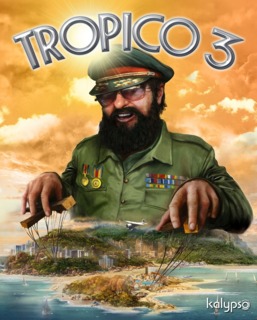Tropico 3, a true-to-form remake of the classic island sim, offers updated graphics and working automobiles.
The most common criticism of the original Tropico title was that no city or island simulation could be complete without some semblance of a transportation system. In PopTop's classic game, players often spent hours waiting for teamsters to push carts of tobacco and rum up and down dirt paths. Even on a well-planned island, workers sometimes spent twice as much time traveling to and from work as they spent actually working. It sometimes took years of simulation-time for a teamster to transport gold or iron from a mine site to a nearby dock.
Tropico 3 has addressed this problem head-on with its implementation of an automobile transportation system. Citizens can use automobiles for their daily commutes, and some workers also have access to automobiles at work. The most important new building in Tropico 3 is the Garage. If citizens live near a Garage, then they will walk to the Garage and hitch a ride to their work site. Similarly, placing a Garage near work sites encourages faster trips home at the end of the workday. Teamsters and construction workers also can use trucks to access work sites, and policemen can drive cars to conduct more efficient patrols of your island. (Each Teamsters office, construction office, and police station has its own "Garage" system built into the lot.)
While the new transportation system in Tropico 3 makes the game initially feel remarkably different from the original Tropico, it soon becomes glaringly obvious that nearly nothing else about the gameplay has been changed. The economy is still based almost entirely on raw materials and industry; in fact, it's based on the exact same materials and industries as the original. It is unfortunate, but Tropico 3 still provides no viable options for fostering an authentic service economy other than tourism-related jobs. The game still presents itself as offering players a "stark choice" of running a capitalistic or communistic economy, but the reality is that the "capitalistic" path is still entirely rooted in dependency theory. The "capitalist vs. communist" choice is stylistic and has no realistic impact on how the economy works.
Fans of the original Tropico should be generally pleased with this game, but realists and those hoping for an economic overhaul in Tropico 3 will be sorely disappointed.

